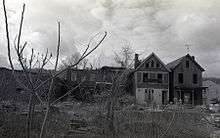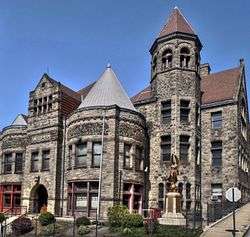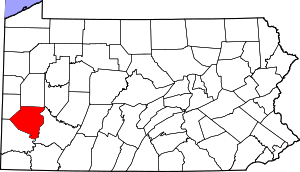Braddock, Pennsylvania
Braddock is a borough located in the eastern suburbs of Pittsburgh in Allegheny County, Pennsylvania, 10 miles (16 km) upstream from the mouth of the Monongahela River. The population was 2,159 at the 2010 census. The borough is represented by the Pennsylvania State Senate's 45th district, the Pennsylvania House of Representative's 34th district, and Pennsylvania's 18th congressional district in the United States House of Representatives.
History
The town is named for General Edward Braddock (1695–1755).[3] The Braddock Expedition, particularly his crossing of the Monongahela River on July 9, 1755 at this place, led to the British general's own fatal wounding and a sound defeat of his troops who had been moving against the French at Fort Duquesne. This battle, now called the Battle of the Monongahela, was a key event at the beginning of the French and Indian War.
The area surrounding Braddock's Field was originally inhabited by the Lenape, ruled by Queen Allequippa.[4] In 1742, John Fraser and his family established the area at the mouth of Turtle Creek as the first permanent English settlement west of the Allegheny Mountains.[4] George Washington visited the area in 1753-1754. It was the site of Braddock's Defeat on July 9, 1755.
Braddock's first industrial facility, a barrel plant, opened in 1850.[4] The borough was incorporated on June 8, 1867.[5] The town's industrial economy began in 1873, when Andrew Carnegie built the Edgar Thomson Steel Works on the historic site of Braddock's Field in what is now North Braddock, Pennsylvania. This was one of the first American steel mills which used the Bessemer process. As of 2010, it continues operation as a part of the United States Steel Corporation. This era of the town's history is depicted in Thomas Bell's novel Out of This Furnace.
Braddock is also the location of the first of Andrew Carnegie's 1,679 (some sources list 1,689) public libraries in the US, designed by William Halsey Wood of Newark, New Jersey, and dedicated on March 30, 1889. The Braddock Library included a tunnel entrance for Carnegie's millworkers to enter a bathhouse in the basement to clean up before entering the facilities (which originally included billiard tables). An addition in 1893, by Longfellow, Alden and Harlow (Boston & Pittsburgh, successors to Henry Hobson Richardson), added a swimming pool, indoor basketball court, and 964-seat music hall that included a Votey pipe organ. The building was rescued from demolition in 1978 by the Braddock's Field Historical Society, and is still in use as a public library. The bathhouse has recently been converted to a pottery studio; the music hall is currently under restoration.
During the early 1900s many immigrants settled in Braddock, primarily from Croatia, Slovenia, and Hungary.
Braddock lost its importance with the collapse of the steel industry in the United States in the 1970s and 1980s. This coincided with the crack cocaine epidemic of the early 1980s, and the combination of the two woes nearly destroyed the community. In 1988, Braddock was designated a financially distressed municipality. The entire water distribution system was rebuilt in 1990-1991 at a cost of $4.7 million, resulting in a fine system where only 5% of piped water is deemed "unaccounted-for.". From its peak in the 1920s, Braddock has since lost 90% of its population.[4]
John Fetterman, mayor of Braddock from 2005 until his 2019 inauguration as Lieutenant Governor of Pennsylvania, launched a campaign to attract new residents to the area from the artistic and creative communities.[4] He also initiated various revitalization efforts, including the nonprofit organization Braddock Redux.[6]
Fetterman appeared in various media to discuss his vision of Braddock's needs, including PBS,[7] The Colbert Report on Comedy Central,[8] CNN, Fox News, CNBC, and The New York Times.[9] In the UK, The Guardian[10] and the BBC have reported on him.[11] He has also had his own episode on Hulu's original series A Day in the Life.[12]
Since 1974, Braddock resident Tony Buba has made many films. One of his earlier films is Justice League centering on the borough and its industrial decline, including Struggles in Steel.[13] In September 2010, the IFC and Sundance television channels showed the film Ready to Work: Portraits of Braddock, produced by the Levi Strauss corporation. This film interviews many of the local residents and shows their efforts to revitalize the town.[14]
Geography
According to the United States Census Bureau, the borough has a total area of 0.6 square miles (1.6 km2), of which, 0.6 square miles (1.6 km2) is land and 0.1 square miles (0.26 km2) (13.85%) is water. Its average elevation is 764 ft (233 m) above sea level.[15]
Government and politics
| Year | Republican | Democratic | Third Parties |
|---|---|---|---|
| 2016 | 9% 82 | 89% 822 | 2% 18 |
| 2012 | 7% 66 | 93% 933 | 1% 4 |
Surrounding and adjacent neighborhoods
Braddock has two land borders, including North Braddock from the north to the southeast, and Rankin to the northwest. Across the Monongahela River to the south, Braddock runs adjacent with Whitaker and West Mifflin.
Demographics

| Historical population | |||
|---|---|---|---|
| Census | Pop. | %± | |
| 1870 | 1,290 | — | |
| 1880 | 3,310 | 156.6% | |
| 1890 | 8,561 | 158.6% | |
| 1900 | 15,654 | 82.9% | |
| 1910 | 19,357 | 23.7% | |
| 1920 | 20,879 | 7.9% | |
| 1930 | 19,329 | −7.4% | |
| 1940 | 18,326 | −5.2% | |
| 1950 | 16,488 | −10.0% | |
| 1960 | 12,337 | −25.2% | |
| 1970 | 8,795 | −28.7% | |
| 1980 | 5,634 | −35.9% | |
| 1990 | 4,682 | −16.9% | |
| 2000 | 2,912 | −37.8% | |
| 2010 | 2,159 | −25.9% | |
| Est. 2019 | 2,105 | [2] | −2.5% |
| Sources:[18][19][20][21] | |||
As of the census[20] of 2000, there were 2,912 people, 1,161 households, and 695 families residing in the borough. The population density was 5,159.9 people per square mile (2,007.7/km²). There were 1,624 housing units at an average density of 2,877.6 per square mile (1,119.7/km²). The racial makeup of the borough was 30.12% White, 66.52% African American, 0.14% Native American, 0.24% Asian, 0.69% from other races, and 2.30% from two or more races. Hispanic or Latino of any race were 1.51% of the population.
There were 1,161 households, out of which 30.0% had children under the age of 18 living with them, 21.4% were married couples living together, 31.8% had a female householder with no husband present, and 40.1% were non-families. 37.0% of all households were made up of individuals, and 18.6% had someone living alone who was 65 years of age or older. The average household size was 2.47 and the average family size was 3.24.
In the borough the population was spread out, with 31.5% under the age of 18, 6.3% from 18 to 24, 24.9% from 25 to 44, 19.1% from 45 to 64, and 18.3% who were 65 years of age or older. The median age was 36 years. For every 100 females, there were 84.3 males. For every 100 females age 18 and over, there were 78.1 males.
The median income for a household in the borough was $18,473, and the median income for a family was $20,669. Males had a median income of $26,333 versus $19,867 for females. The per capita income for the borough was $13,135. About 34.4% of families and 35.0% of the population were below the poverty line, including 54.4% of those under age 18 and 14.5% of those age 65 or over.
In popular culture
- A&P's first supermarket opened in Braddock in 1936.[22]
- George A. Romero's 1978 horror film Martin takes place in Braddock and was largely filmed there.
- Parts of the 1996 TV film The Christmas Tree, Sally Field's TV directorial debut, were shot in the Braddock Carnegie Library.
- Levi Strauss & Co., the maker of Levi's jeans, chose the borough for its "youth" commercial campaign which was televised in late 2010 and 2011.[23]
- The 2010 film One for the Money used the shuttered University of Pittsburgh Medical Center facility in Braddock as the "Trenton Police Headquarters".
- Thomas Bell's historical novel Out of This Furnace is set in Braddock during the 1890s to the 1930s.[24]
- Out of the Furnace, a film starring Christian Bale released in 2013, was shot in Braddock.[24]
- Helen Campbell's novel Turnip Blues, detailing the lives of Depression-era immigrants, is set in Braddock.
- Episode 1 of OtherLife is set there.
- Episode 1 of the TV series Mindhunter is set in Braddock.
Notable people
- Thomas Bell – novelist; set Out of This Furnace in Braddock
- John Clayton – sportswriter and NFL analyst
- Henry Clay Drexler – recipient of the Navy Cross and Medal of Honor
- Matthew A. Dunn – former member of the United States House of Representatives
- John Fetterman – Mayor of Braddock, candidate for the US Senate in 2016, and Lieutenant Governor of Pennsylvania
- LaToya Ruby Frazier – artist; 2015 MacArthur Fellow
- James Samuel Gallagher – former member of the Wisconsin State Assembly
- Joseph M. Gaydos – former member of the United States House of Representatives
- Vernon Irvin – Chief Marketing Officer for XM Satellite Radio
- Captain Bill Jones – first superintendent of the Edgar Thompson Works under Andrew Carnegie
- Melville Kelly – former member of the United States House of Representatives; established the Braddock Leader newspaper
- Billy Knight – former Pittsburgh Panther and NBA player and executive
- Blak Czer - Rapper and music producer
- Sean Lomax – professional whistler
- John Maisto – former ambassador to Venezuela, Nicaragua, and the Organization of American States
- Tom Major-Ball - music hall performer and father of British Prime Minister John Major[25]
- Joseph A. McDonald – steel industry executive
- Art Pallan – radio celebrity
- George Peppard – lived and worked in Braddock as a radio announcer in his early career
- James L. Quinn – former member of the United States House of Representatives
- Frank S. Scott – first enlisted member of the United States armed forces to lose his life in an aircraft accident[26]
- Lauren Tewes – actress best known for playing Cruise Director Julie McCoy on The Love Boat
References
- "2019 U.S. Gazetteer Files". United States Census Bureau. Retrieved July 28, 2020.
- "Population and Housing Unit Estimates". United States Census Bureau. May 24, 2020. Retrieved May 27, 2020.
- Porter, Thomas J. Jr. (May 10, 1984). "Town names carry a little bit of history". Pittsburgh Post-Gazette. p. 1. Retrieved 26 May 2015.
- "Braddock, Pennsylvania". Retrieved 2007-08-18.
- "Allegheny County - 2nd Class" (PDF). Retrieved 2007-08-18.
- BraddockRedux.org, accessdate September 4, 2009
- Profile of Fetterman and Braddock on the show NOW on PBS
- http://www.levistrauss.com/blogs/fetterman-v-colbert Archived August 20, 2010, at the Wayback Machine
- "Rock Bottom for Decades, but Showing Signs of Life". The New York Times. January 31, 2009. Retrieved October 19, 2010.
'Space is cheap here,' said Mr. Gustafson, 30. 'We can afford to focus on our hobbies.' He is a graphic designer; she is a photographer.
- Pilkington, Ed (July 15, 2009). "Coolest mayor in America? Why John Fetterman has his postcode tattooed on his arm". The Guardian. London. Retrieved July 15, 2009.
- BBC.co.uk: US mayor strikes unconventional note
- "John Fetterman". HULU. May 7, 2012. Archived from the original on May 18, 2012. Retrieved May 23, 2012.
- https://www.imdb.com/name/nm0117780/
- Braddock Film Gets Additional Airing, WDUQ News
- "US Board on Geographic Names". United States Geological Survey. 2007-10-25. Retrieved 2008-01-31.
- EL. "2012 Allegheny County election". Pittsburgh Tribune-Review. Retrieved 15 October 2017.
- EL. "2016 Pennsylvani general election..." Pittsburgh Post-Gazette. Retrieved 15 October 2017.
- "Number of Inhabitants: Pennsylvania" (PDF). 18th Census of the United States. U.S. Census Bureau. Retrieved 22 November 2013.
- "Pennsylvania: Population and Housing Unit Counts" (PDF). U.S. Census Bureau. Retrieved 22 November 2013.
- "U.S. Census website". United States Census Bureau. Retrieved 2008-01-31.
- "Annual Estimates of the Resident Population". U.S. Census Bureau. Archived from the original on 19 October 2013. Retrieved 22 November 2013.
- http://www.groceteria.com/store/national-chains/ap/ap-history/
- "Archived copy". Archived from the original on 2010-10-13. Retrieved 2010-10-07.CS1 maint: archived copy as title (link)
- Braddock, Pennsylvania - Out of the Furnace and into the Fire
- John Major, The Autobiography, HarperCollins (1999), pp. 2-3.
- "Corporal Frank S. Scott". Scott AFB History Office. 2006-04-17. Retrieved 2006-08-31.
External links
| Wikimedia Commons has media related to Braddock, Pennsylvania. |
| Wikisource has the text of the 1911 Encyclopædia Britannica article Braddock. |
- 2005 Pittsburgh City Paper feature story about Braddock including history, interviews with residents and a controversial highway project
- Pittsburgh City Paper feature story about Braddock's urban decay, and the recent influx of artists drawn to the city by mayor John Fetterman
- New York Times: "Braddock, Pa: Rock Bottom for Decades, but Showing Signs of Life"
- Article in the UK's Guardian newspaper about mayor John Fetterman
- The Battle of the Monongahela, which took place in Braddock in 1755


.svg.png)
